May 15, 2019 – How do you cultivate innovation in a traditionally risk-adverse legal profession? Where do you begin? Listen, ask “why,” and challenge the status quo, say Wisconsin Legal Innovators.
As the State Bar of Wisconsin begins its search for 2019 Wisconsin Legal Innovators, previous winners encourage the legal profession to celebrate those good ideas by nominating the next class of innovators.
“Innovation breeds innovation, just like success breeds success,” says 2017 Legal Innovator Seth Dizard. “As lawyers, our reputation is our stock in trade, and favorable exposure enhances a lawyer’s reputation, plain and simple.”
Nominations are open through June 30.
Push the Envelope
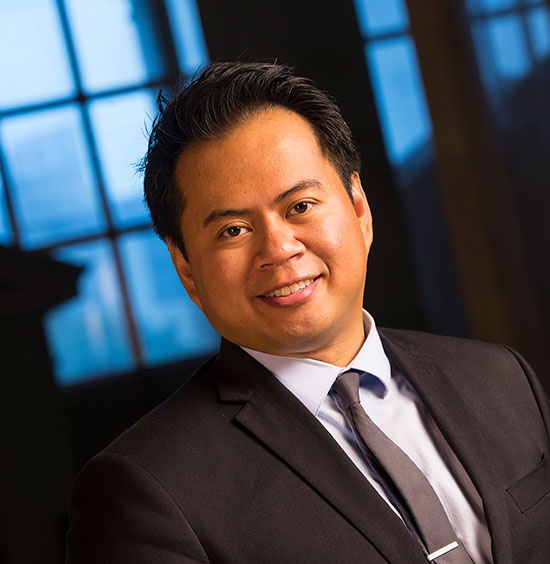
Raphael Ramos, a 2018 Wisconsin Legal Innovator, says the selection of the Milwaukee and Madison Eviction Defense Projects enhanced the program’s credibility and gave Legal Action of Wisconsin an opportunity to thank and recognize the lawyer-volunteers who help low-income tenants facing evictions. Photo: Kevin Harnack
“Push the envelope, challenge the status quo,” says 2018 Wisconsin Legal Innovator Raphael Ramos of Legal Action of Wisconsin’s Eviction Defense Projects. “It often leads to impactful results.”
 Joyce R. Hastings is the communications director for the State Bar of Wisconsin, Madison. She can be reached by email or phone at (608) 250-6126.
Joyce R. Hastings is the communications director for the State Bar of Wisconsin, Madison. She can be reached by email or phone at (608) 250-6126.
Ramos, who is project director for a Milwaukee County effort that provides legal help to low-income tenants facing eviction, dramatically improved the results for these clients.
Previously, tenants facing eviction, most of whom typically self-represent, would lose their cases. When an eviction defendant is represented, courts think more about tenants’ rights, and clients make well-informed decisions for their families.
“When developing new ideas, look to others doing similar work. Learn from their mistakes,” observes Ramos. “Yet, it’s critical that we do more than simply imitate what has made others successful.”
‘Innovation’: It Shouldn’t Be Daunting
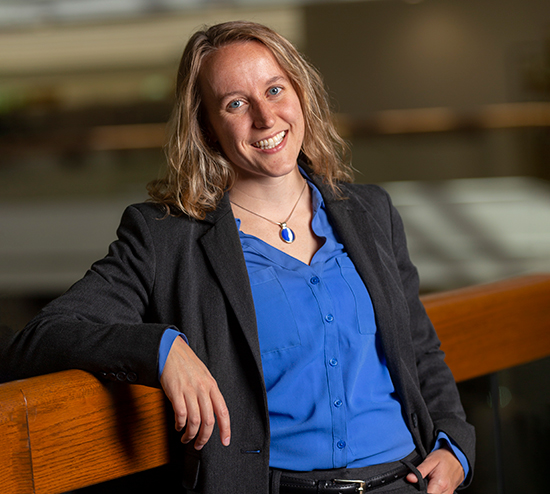
“Innovation shouldn’t be daunting,” says Abby Churchill, founder of Trans Law Help Wisconsin, Madison. “I saw a gap in services and figured it out from there.” Photo: Andy Manis
“I think the concept of ‘legal innovation’ can be a bit daunting,” says Abby Churchill, founder of Trans Law Help Wisconsin, Madison. “Innovation doesn’t require completely original thought; it can also mean initiating or establishing a legal service that fills a community need.”
Churchill, a 2018 Wisconsin Legal Innovator, developed a statewide attorney-referral network to help transgender people facing a multifaceted set of legal challenges. “These challenges are based partly on the societal misconceptions about what it means to be transgender as well as the systemic marginalization of the community across many socioeconomic factors.”
“I cannot say that I went into this project intending to innovate; rather, I saw a gap in services, confirmed there was a community need, and figured it out from there,” says Churchill. “It was incredibly rewarding to build this project upon the notion that the community dictates the services we provide.”
Listen, Talk to Clients
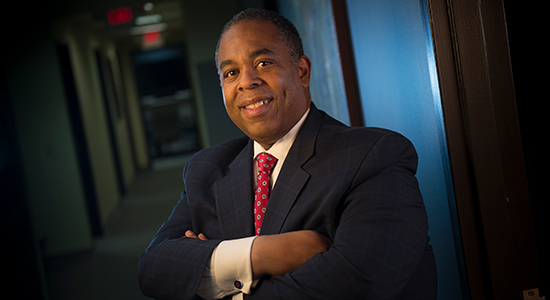
Emery Harlan, Milwaukee, is last year’s Lifetime Innovator for his conscious efforts to increase diversity within the legal profession. Without that consciousness, he says, “There’s a natural pull for people to gravitate toward people who are like them. You have to take some intentional steps to overcome that.” Photo: Kevin Harnack
“Innovation is critical to ensuring that our profession remains vital in society,” says Emery Harlan. Harlan, a partner with MWH Law, Milwaukee, was recognized last year as a Lifetime Legal Innovator for his conscious efforts to increase diversity at his law firm and within the legal profession.
“The pace of change in business has been incredible, and the law must keep pace,” says Harlan. “Listen. Talk to clients and other third parties. Find out what they’re concerned about and interested in. This information will inform what changes you need to make,” he says.
Anne Smith of Madison Seed Accelerator Inc. (a/k/a Madworks) agrees with Harlan about the pace of change. “How people consume services is quickly evolving,” she says. “While law lags behind other industries, it is just as important for the legal profession to be aware of consumer trends and adapt to new business models that reflect client expectations.”
Last year Smith, along with other Madison-area attorneys, was recognized for helping start-up entrepreneurs tackle their governance challenges, like board management, financials, and legal and risk management issues. “The goal of this program is to build companies that last,” she says.
Think Differently
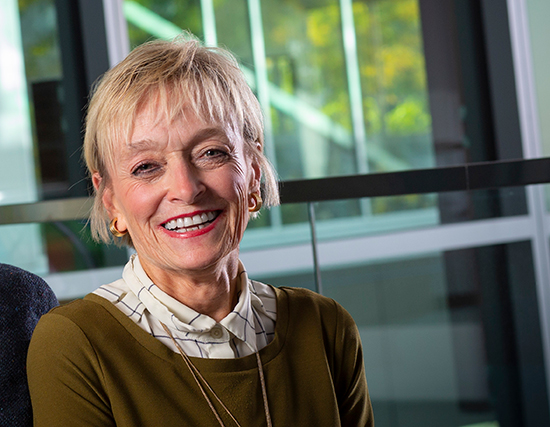
Madison Seed Accelerator Inc. program manager co-founder Anne Smith say the goal of the pro bono program is to build companies that last. Smith also was recognized in 2014 for her innovative work with the Law & Entrepreneurship Clinic at the U.W. Law School. Photo: Andy Manis
“When a person starts a business, they define their value proposition,” says Smith. “Lawyers often don’t think about the value they provide to their clients.”
“You can do the best lawyering and still have a client that may not be satisfied with your services,” Smith adds. “Define the value, and ask the client if you provided that value. For new lawyers starting out, think about your career as a business. Set goals and revisit those goals at least annually to ensure you’re moving in the right direction. If your direction has changed, make sure you like the new direction.”
“We should not be afraid to try new things,” continues Ramos. “Whether the innovation takes the form of a new program or a novel argument, the work that goes into developing and implementing a concept can bear fruit in the short term while illuminating new and better ideas for the future.”
Private lawyer Seth Dizard (above) and municipal lawyer Nick DeSiato struck on the idea of using receiverships to deal with foreclosed or nuisance properties in Milwaukee. Both were recognized as Legal Innovators in 2017.
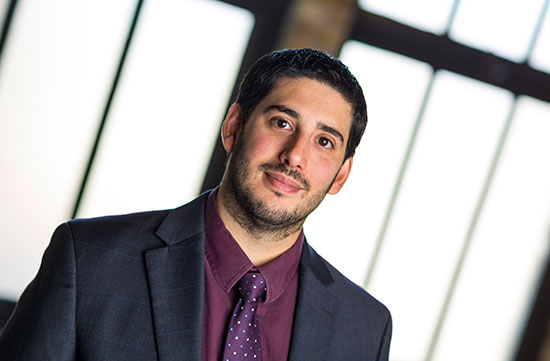
Private lawyer Seth Dizard (above) and municipal lawyer Nick DeSiato struck on the idea of using receiverships to deal with foreclosed or nuisance properties in Milwaukee. Both were recognized as Legal Innovators in 2017.
Wanted: 2019 Wisconsin Legal Innovators
Former Wisconsin Legal Innovators embrace other benefits of recognition.
“I have seen an increase in the number of people reaching out to Trans Law Help Wisconsin as a result of this award,” says Churchill. “Individuals who may not have known about us are now using this resource. And, personally, the award serves as a reminder that my devotion to this work does not go unnoticed.”
Anne Smith of Madworks echoes Churchill’s experience. Last year’s award “attracted applicants to our program that otherwise would not have known it existed.
“And, I cannot tell you how many people – lawyers and nonlawyers – who have commented on our receipt of the award,” says Smith. “I believe it added to my reputation in the community, too.”
“The selection of the Eviction Defense Project enhanced our credibility and gave us the opportunity to thank and recognize our volunteers that make our work possible,” says Ramos. “It gave us the credibility to approach fundraisers and solicit new program volunteers.”
“Nominating innovators for this award promotes and facilitates creativity within the profession,” says Ramos.
Nominate a Wisconsin Legal Innovator: Deadline June 30
 Tell us about the people and ideas that are changing Wisconsin’s legal landscape. Through the “That’s a Fine Idea: Legal Innovation Wisconsin” initiative, the State Bar of Wisconsin is asking the legal community to help it tell the story of legal innovation. The Wisconsin Lawyer will feature the people behind the best examples of legal innovation in the November 2019 issue.
Tell us about the people and ideas that are changing Wisconsin’s legal landscape. Through the “That’s a Fine Idea: Legal Innovation Wisconsin” initiative, the State Bar of Wisconsin is asking the legal community to help it tell the story of legal innovation. The Wisconsin Lawyer will feature the people behind the best examples of legal innovation in the November 2019 issue.
Innovation can come in many forms. It could mean:
- New ways to use technology to improve client service or serve a new market
- Best practices for promoting workplace diversity
- New marketing/business development strategies
- New ways of providing pro bono or reduced-cost services
- Changes in internal operations that result in greater efficiency
Learn more or find the nomination form at ThatsaFineIdea.com. The deadline for nominations is June 30, 2019.
